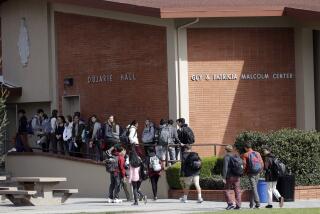Foes Fume as School Gets Grant for Clinic
- Share via
San Fernando High School received a two-year, $200,000 grant Wednesday to establish a campus medical clinic that has caused controversy in the largely Catholic community because it will offer birth-control counseling and contraceptives.
Announcement of the grant was made by the New Jersey-based Robert Wood Johnson Foundation, the nation’s largest underwriter of school-based clinics. The money will be used to start clinic operations. After two years, officials will review the clinic and make an additional grant of $400,000 if San Fernando’s program meets foundation standards.
The foundation made a similar two-part grant Wednesday to Los Angeles High School in Central Los Angeles. Last May, it gave Jordan High in Watts a six-year, $600,000 grant to start a campus health clinic. The three schools will be the first in the Los Angeles Unified School District to have campus medical centers.
Yearlong Battle
For supporters and foes of the San Fernando clinic, the announcement ended a yearlong battle.
Opponents have mounted protest marches and petition drives, and lobbied foundation directors to turn down the school district’s request to fund a San Fernando High clinic. They have pointed out that about 85% of the students at San Fernando High School are Latino, and that most are Roman Catholics. Catholic doctrine does not allow its followers to use artificial forms of birth control.
“I’m really frosted,” said Eadie Gieb, a spokeswoman for Parents and Students United of the San Fernando Valley, a group that has actively fought establishment of the school clinic.
10,000 Signatures
“The Johnson directors were very much aware of the community opposition to the clinic,” Gieb said. “We sent them petitions with 10,000 signatures of parents and community members who oppose a campus clinic. I doubt that they received the signatures of 10,000 people in support of the clinic.”
But clinic supporters were jubilant when they learned that the San Fernando and Los Angeles clinics had been funded.
“I’m thrilled beyond words,” said school board member Roberta Weintraub, who, along with board member Jackie Goldberg, two years ago authored the original clinic proposal. “Now we can deal with teen-age pregnancy and the health care needs of these students in a realistic way.”
San Fernando High School’s clinic is scheduled to open sometime this fall, according to Dr. Alfred Clark, administrator of the district’s Student Health Services Division. The clinic will be operated by the Northeast Valley Health Corp., which receives federal funds to run clinics in Pacoima and San Fernando. Physicians from UCLA Medical School will staff the campus clinic.
Range of Medical Care
All high school clinics will offer a wide range of medical care to students who have written parental permission. Services will range from immunization, physicals, screening for high blood pressure and diabetes to treatment of minor medical emergencies. The clinics will also provide counseling for drug abuse, suicide prevention and family planning.
San Fernando, Los Angeles and Jordan were chosen by the Board of Education for the school-based clinic program because they have high rates of teen-age pregnancy and drug abuse. Also, many of the students at these schools come from poor families that cannot afford health insurance or who do not have private physicians.
In a recent survey at San Fernando High School, 40% of the students said their families did not have health insurance and 76% said that, at least once in the past year, they did not receive medical care when they needed it.
Principal Pleased
“I’m very elated that the foundation recognized the needs at San Fernando and has given us the money to help solve the medical and emotional problems of our students,” said San Fernando Principal Bart Kricorian.
Gieb saw it differently. “I’m really angry that the school board has pushed this clinic onto a minority community that doesn’t want it,” she said. “I can’t say right now what we are going to do, but we are not going to accept this. We are going to talk to a lawyer. We don’t want a clinic here.
She added: “They may open the doors of the clinic this fall, but they may not have any children walking through those doors.”
Kricorian said he does not expect any problems when the clinic opens.
“When the community sees the benefits of the clinic and that use of the clinic is voluntary and with written parental permission, I believe they will support it,” he said.
More to Read
Sign up for Essential California
The most important California stories and recommendations in your inbox every morning.
You may occasionally receive promotional content from the Los Angeles Times.













